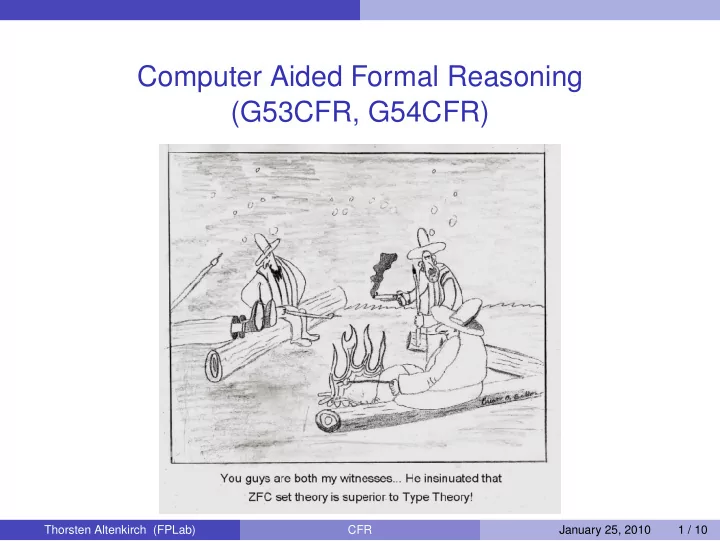

Computer Aided Formal Reasoning (G53CFR, G54CFR) Thorsten Altenkirch January 25, 2010 Thorsten Altenkirch (FPLab) CFR January 25, 2010 1 / 10
Zermelo-Fraenkel Set Theory Zermelo (1871-1953) Fraenkel (1891-1965) Axiomatic Set Theory ≈ 1925 ZFC = Zermelo-Fraenkel with Axiom of Choice Foundations of modern Mathematics Additional axioms, e.g. the continuum hypothesis Thorsten Altenkirch (FPLab) CFR January 25, 2010 2 / 10
Axiom of extensionality ∀ x ∀ y [ ∀ z ( z ∈ x ⇔ z ∈ y ) ⇒ x = y ] Axiom of regularity ∀ x [ ∃ a ( a ∈ x ) ⇒ ∃ y ( y ∈ x ∧ ¬∃ z ( z ∈ y ∧ z ∈ x ))] Axiom schema of specification ∀ z ∀ w 1 . . . w n ∃ y ∀ x [ x ∈ y ⇔ ( x ∈ z ∧ φ )] Axiom of pairing ∀ x ∀ y ∃ z ( x ∈ z ∧ y ∈ z ) Axiom of union ∀F ∃ A ∀ Y ∀ x ( x ∈ Y ∧ Y ∈ F ⇒ x ∈ A ) Axiom schema of replacement . . . Axiom of infinity . . . Axiom of power set . . . Axiom of Choice . . . Thorsten Altenkirch (FPLab) CFR January 25, 2010 3 / 10
Set Theory for Computer Science? Set Theory is untyped (everything is a set), while programming languages are typed (either statically or dynamically). Basic concepts from computer science (records, functions) are not primitive in Set Theory. Basic operations in set theory (e.g. ∩ , ∪ ) are not directly available on types. Set Theory is not constructive, i.e. there is a set theoretic function solving the Halting Problem. Question: Is there an alternative to Set Theory? Thorsten Altenkirch (FPLab) CFR January 25, 2010 4 / 10
Martin-Löf Type Theory Per Martin-Löf (1942-) Martin-Löf introduced Type Theory as a constructive foundation of Mathematics since 1972. Type Theory doesn’t rely on predicate logic but uses types to represent propositions. Basic operations on types are Π -types (dependent function types) and Σ -types (dependent records). Type Theory is a programming language. Thorsten Altenkirch (FPLab) CFR January 25, 2010 5 / 10
Propositions as types (The Curry-Howard Isomorphism) A proposition corresponds to the types of it proofs. A proposition is true if the corresponding type is non-empty. Conjunction A ∧ B is repesented by cartesian product ( A × B ). Implication A → B is represented by function types A → B (looks the same). ∀ and ∃ correspond to Π (depednent function) and Σ (dependent records). Thorsten Altenkirch (FPLab) CFR January 25, 2010 6 / 10
Agda Ulf Norell Ulf Norell has implemented Agda, a functional programming language based on Type Theory in his PhD in 2007. Agda is inspired by earlier systems such as Epigram, Cayenne and Coq. Agda can be used to program and to reason. Thorsten Altenkirch (FPLab) CFR January 25, 2010 7 / 10
Course contents Agda intro 1 Propositions as types (using Agda) 2 Dependently typed programming (in Agda) 3 ◮ Refining programs to certifiably correct programs ◮ Representing data formats ◮ Typed Domain Specific Libraries Thorsten Altenkirch (FPLab) CFR January 25, 2010 8 / 10
Practicalities Two lectures: Tuesday and Thursday morning. The early student catches the first. Lab sessions each Friday 10:00, B52 (using Agda) Regular coursework (in Agda) Resources: available online http://www.cs.nott.ac.uk/˜txa/g53cfr/ Thorsten Altenkirch (FPLab) CFR January 25, 2010 9 / 10
Assessment G53CFR 40% Exercises 60% Online exam G54CFR 40% Online exam 60% Project Thorsten Altenkirch (FPLab) CFR January 25, 2010 10 / 10
Recommend
More recommend